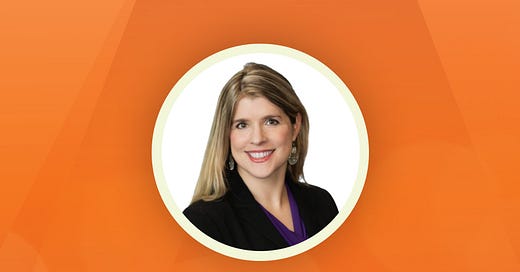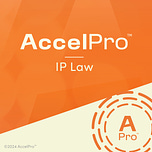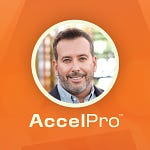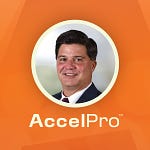Welcome to AccelPro IP Law. If this email was forwarded to you, please sign up here.
And if your colleagues in any sector of the IP law field might be interested, please let them know about AccelPro. As our community grows, it grows more useful for its members. Send comments and questions to: questions@joinaccelpro.com
Listen on Apple Podcasts and Spotify.
Welcome to AccelPro IP Law, where we provide expert interviews and coaching to accelerate your professional development. Today we’re going to talk with Jamaica Szeliga, a partner at Seyfarth specializing in IP litigation, patent prosecution and corporate IP matters.
In this interview, Szeliga discusses patent issues for bioinformatics and biologics, patent eligibility and patent reform.
Jamaica graduated magna cum laude from Harvard Law School, and received her B.S. in Chemistry, with a minor in Biology, with distinction, from Stanford University.
Jamaica recently was listed in Women We Admire’s Top 50 Women Leaders in Law of 2022. She also recently became the co-host of Seyfarth’s Health Care Beat Podcast series. The supplemental materials and episode transcript are available below.
Listen on Apple Podcasts and Spotify.
Interview References:
Jamaica Szeliga’s Seyfarth Shaw profile.
14:56 | Hatch-Waxman Letters (2022). US Food and Drug Administration.
15:12 | Implementation of the Biologics Price Competition and Innovation Act of 2009 (2016). US Food and Drug Administration.
Supplemental Materials:
TRANSCRIPT
I. PATENT ELIGIBILITY AND HEALTHCARE
Neal Ungerleider, Host: Can you give our listeners some background on Seyfarth and your role there?
Jamaica Szeliga: We're a full service international law firm. We have 16 offices, and about 900 attorneys. I'm an IP partner here at Seyfarth. I'm a member of the health law practice because of my background. I have a chemistry degree with a biology minor, and my role is basically to help companies with patent licensing, patent prosecution, and litigation, if necessary, and I also weigh in on some FDA issues as they come up.
NU: How does patent eligibility impact healthcare?
JS: There are many inventions that can be patented relating to healthcare. Most of the things that people think about are the things you can touch, feel, or that you have to take as medicine: medical devices, monitors, hip implants, IV medicines, oral medicines— all of that is pretty simple to understand as being patentable. It always has been patentable. However, healthcare has really evolved, and certain innovations are not patent eligible. The Supreme Court has really mucked things up and made it very difficult to understand what is patent eligible and what isn't patent eligible.
It used to be everything under the sun made by people. That's what the easy test used to be. Now there's a two-part test. Basically, for healthcare purposes you can't patent an abstract idea, a law of nature, a mathematical formula, or a natural phenomena, and some of the biggest advances we have nowadays actually in that area. In order to be patent eligible, you have to add—and this is, sadly, in the Supreme Court words’—"more.” It becomes very difficult to determine whether you can get a patent in certain areas, and, in particular, the latest hottest areas in healthcare.
When I talk about those areas, I'm mentioning things like bioinformatics. Nowadays, there are huge amounts of information that we are gathering from all kinds of computer sources. We are gathering information on patient data, on health records, on insurance data, Medicare claims—we have all of this data, and some of the best inventions and innovations that we have right now are how to process that data.
What can we learn from that data? Can we learn which doctors are best? Can we learn which techniques are best for particular surgeries? What outcomes are best? How do we determine trends? Are we moving forward with respect to racial barriers and racial discrimination in healthcare? There’s all of these areas that we are improving on, and we have innovations that improve them that are based on the intake of massive amounts of data.
However, that can create a problem with patent eligibility. The way that I like to think about patent eligibility is, Could a fantastically amazing team of people given all of those resources in front of them and, using a pen and paper, maybe a calculator, come up with the same answers? If yes, you're going to have a problem with patent eligibility.
Instead, you have to be creative in how you patent things. You have to incorporate new technologies. You can't just say, "A computer does this,” even though that's what's really necessary in order to do these types of calculations. With digital health, that's one aspect that becomes very important if you are determining, for instance, what genes are causing a particular disease or condition.
It's not easy to be patent eligible for each of these things. Again, if you think about the most amazing team working with every piece of data as perfectly as possible, that is kind of what a computer is, and that's considered to be not patentable. We have to think about the impact of the invention, we have to think about how it's useful, and all kinds of considerations.
The other area that's really impacted by patent eligibility is genetics and gene editing. That is, the concept of finding genes that are related to particular diseases and testing for those genes, as well as making treatments. A lot of the biological treatments that are being used today are based on things that are naturally occurring. You realize that in order to get some kind of response, a molecule has to land in a receptor, so you make more of those molecules, more receptors get filled, you get a better impact. If you just make the molecule that exists in nature, well, that's a law of nature. Even if it took you forever to find that molecule to get it delivered correctly, it's still natural.
You have to think on a lot of different levels around patent eligibility requirements. As I said, the Supreme Court weighed in and decided that a test that had been in place for many years, I think perhaps even more than a hundred years, was not sufficient.
Now we have this two-step process where you have to figure out if there's something, quote unquote “more” than just nature existing in your patent, no matter how much effort was put into it. So that's how patent eligibility is affecting healthcare.
The third area that everybody talks about is AI. Artificial intelligence again goes hand in hand with bioinformatics. You have gaps in your data, so you train the computer to fill in those gaps.
Well, is that really an innovation? What it does, is it requires a lot of creativity, and then sometimes you just don't get a patent on something. No matter how fundamental, no matter how much money you can make out of it, no matter how important it is, you don't receive the rewards you would if patents were provided equitably as things that really advance the world.
—
II: PATENT ELIGIBILITY REFORM
NU: With bioinformatics, you're dealing with these extremely large data sets and very complicated software, and the hardware architecture that goes with it. From a patent eligibility perspective, are there different concerns for bioinformatics as opposed to other fields where you're also dealing with large quantities of data such as precision manufacturing?
JS: It's similar. I think the main difference is that, in many ways, it’s more difficult to say that there's a useful good at the end compared to precision manufacturing. With bioinformatics, the useful good is knowledge. You can frame your claim in precision manufacturing as an improvement of the process of making something based on the following set of steps. It's the something that takes it out of that realm, like understanding the effect of hospital stays on patient health. It still doesn't have that concreteness that the Supreme Court is looking for.
Often, you do your best to take it towards a process that people can understand and towards something that is concrete, but a lot of bioinformatics is a double whammy where you're trying to understand laws of nature.
For example, you can have a process for understanding disease progression by using thousands and thousands of sources in various configurations. We don't use the term algorithms, so a lot of this is about creative prosecution and persistent prosecution. It’s about explaining over and over again how this is an innovation, how this is more than what a human can do—and trying to dig down and hit the buzzwords, may I just say, that are considered what you need for patent eligibility.
The patent eligibility requirements in healthcare have significant hurdles that I have to overcome as a prosecutor. Moreover, some of them are what I would call artificial.
It's a little bit more of a game than it necessarily should be.
NU: What are some major issues around patent eligibility reform and healthcare?
JS: A lot of the patent eligibility reform is not necessarily directed to healthcare, except when it comes to genetic testing, genetic editing, biologics, and making medicines that are derived pretty much from natural phenomena. However, the reform efforts keep coming up and they keep dying. Of course, the reform needs to come from Congress given that the Supreme Court has spoken and refuses to take any other cases to try to clarify things.
Congress introduced another patent eligibility reform back in 2022. The way they're trying to change patent eligibility is to give a fixed list of things that are not patent eligible. In other words, everything but what’s on this list, you should be able to get a patent for. They want to cover everything that they possibly can. Now, the latest language is a process that is a non-technological economic/business/social/cultural/artistic process.
This would be a mental process performed solely in the human mind (they're trying to get at the computer element), something that occurs in nature wholly independent of any human activity, a gene as it exists in the human body, or a mathematical formula “apart” from a useful invention or discovery.
What you see in reform is the difficult concept of trying to decide what exactly is patent eligible. Every time that there’s a reform effort, there’s tension in the different technological areas. The computer high-tech industry doesn’t want a lot of these patents that are based on business methods, algorithms, or detecting data to go through. They're not necessarily thinking of bioinformatics at all when they're thinking about patents.
Whereas the medical and health industries want protection. Again, we don't have a system where one invention is more important than another, but in healthcare and pharmaceuticals, there is a sense that they’re more important. Something affecting health, affecting life, affecting abilities to provide appropriate care, all of that is much more important than a widget. So why does a widget get covered? A widget such as a pair of eyeglasses or a game?
What you sense is that patent reform and patents in general are subject-matter neutral, and patent eligibility is subject-matter neutral. However, there's not a good definition out there that is clear enough to explain and cover things that are useful or important. The original task really was if it was manmade, it was good enough. That meant if a computer did it, or if you took a gene and isolated it and kept it exactly the same, all of that used to be hands-down patentable. And now it's become much more complicated and the end result is that reform is necessary. But I think it's difficult; it's very difficult.
NU: From your perspective, what's unique about doing patent litigation for these kinds of clients?
JS: What's very unique in general about pharmaceutical and medtech sectors is that there are actual systems in place and separate administrative processes for certain types of pharmaceutical and biologic medicines. If you want to get a generic on the market, for example, there is an entire process called the Hatch-Waxman Act that involves a very specific type of litigation. There are notices and it only takes place before a judge, so that type of patent litigation is very specific.
Then there's the Biologics Price Competition Innovation Act, the BPCIA, which was supposed to help generic biologics come on the market. Biologics are things like Humira, which most people know about, and Enbrel. These are some gene editing medicines in use now. They are things that are made from biologic products rather than discrete molecules put together, like pharmaceuticals. The BPCIA has a very complicated structure where you're exchanging information, you're trying to decide what patents can go forward, then you litigate those patents, and then there's more patents to come.
In basic terms, these are issues that have been around forever with patent litigation. With the new digital, the more complicated issues relating to genes and genetic medicines, the unique part of that is having to overcome patent eligibility. There are certain courts that will look at patent eligibility before any other process in the litigation happens so they can grant summary judgment. They will stop the whole litigation in its tracks if the other side can prove that it's not patent eligible material.
For example, let’s say I have this amazing patent on bioinformatics. Someone copies it verbatim. I sue them, but before we get into whether they infringed, before we get into whether my invention was invalid because someone else already did it, or it was obvious, before I get to put forth evidence of my success and how important this is and how everybody in the industry was awed at it, before I get to do anything, the alleged infringer can file a brief requesting summary judgment and say my patent's ineligible. I don't get to put any of that evidence before a jury.
Under those circumstances, given how confusing the law is on patent eligibility, I lose out on several years, to be honest, where I could have been litigating against the infringing party because I had taken it up to appeal. Then the federal circuit gets to hem and haw about what patent eligibility is. Hopefully I win, it comes back down to me, and then I can go after the infringer, but by that time, maybe they've stolen most of the market share—because again, the Supreme Court weighed in when I think they shouldn't have.
It used to be as night follows the day—if you won a patent litigation, you could get an injunction against the other side. Now you can't. Now you have to prove all the normal factors of an injunction, so you have a double whammy in certain areas that are really important in healthcare and in the advancement of healthcare. And the harder you make it to get a patent and hold a patent, the less incentive there is to get a patent and also to put in the time and research. You have to protect yourself, and patents are one of the best ways of protecting your ideas and making sure that you benefit from them so you can come up with the next idea.
—
III. THE PATH TO IP LAW
NU: Jamaica, what was your path to IP law?
JS: My pathway was kind of a default. A process of elimination, shall we say. I loved math and I thought it was the most impractical thing ever until high school. I'd had my first chemistry class and I realized, Wow, math is extremely useful. For some reason, chemistry just fascinated me, so I knew I wanted to be a chemistry major. I never changed from that. I went into college as a chemistry major, I came out a chemistry major, but I thought I would do research.
I thought I would be a chemist; I thought I would be a professor. It turned out I was a menace in the laboratory, an absolute menace. We're talking ether fires, broken thermometers—I basically started doing research that was more and more abstract, and the machines still hated me, or I was bored out of my mind. I found that what I really liked to do was talk to my colleagues, help the graduate students write up their experiments and just learn about science. I still loved learning about science.
What do you do then when you don't really know what to do? You think, okay, I'll be a doctor. I'm in science, so I started taking biology classes and I liked them and there wasn't anything wrong with it, but I realized because of health issues in my family that I didn't really want to be responsible for the life and death of an individual person.
I know it might sound harsh, but it’s a reality that you have to be able to compartmentalize and not feel for somebody who’s in pain, and whom you're putting in more pain in order to hopefully get better. It dawned on me when my father had a heart attack that this was a reality. I had never experienced a big illness in my family before then.
So now I'm stuck realizing I really can't work in a laboratory and being a doctor makes no sense for me, but I still love science. What do I do?
At that time, there was a graduate student in one of the laboratories I was working in, the one where I caused the fire (not much damage), and his father had also had a chemistry degree, but then went to law school and basically sued Walmart for slip-and-falls. And that was the first instance that I realized, Wait, you can become a lawyer with any undergraduate degree? No qualifications at all?
Then I thought more about it, I looked into it and I was like Wow, there are patents out there. There are people who need to understand science. There are people that need to explain science. And when you do patent prosecution, you end up with new inventions, things nobody had ever heard of, and nobody had ever thought of. You're learning brand new things. And in patent litigation, you're explaining concepts to a jury, to a judge, to the other side, and to your own client, in some respects.
So, I was still able to use science. I played to my skills; I'm a very good writer; I'm a very clear speaker and I like to explain things, so that's how I ended up in IP law. Process of elimination.
Honestly, just knowing that I would need a job. I still loved my major. I wouldn't want to do anything else, but I had to do something to make a living.
I don't think many people end up in IP law that way. Most people that I know that become IP lawyers, they actually go to graduate school. They get their PhD, and by the time they get their PhD, they realize they hate it, and that's when they start talking about an alternative career. I was lucky enough to be so bad in the laboratory and so bored sometimes that I crossed it off the list really quickly.
Listen on Apple Podcasts and Spotify.
This AccelPro audio transcript has been edited and organized for clarity. This interview was recorded on June 21, 2023.
AccelPro’s interviews and products accelerate your professional development. Our mission is to improve your day-to-day job performance and make your career goals achievable.
Please send your comments and career questions to questions@joinaccelpro.com. You can also call us at 614-642-2235.
If your colleagues in any sector of the IP law field might be interested, please let them know about AccelPro. As our community grows, it grows more useful for its members.












